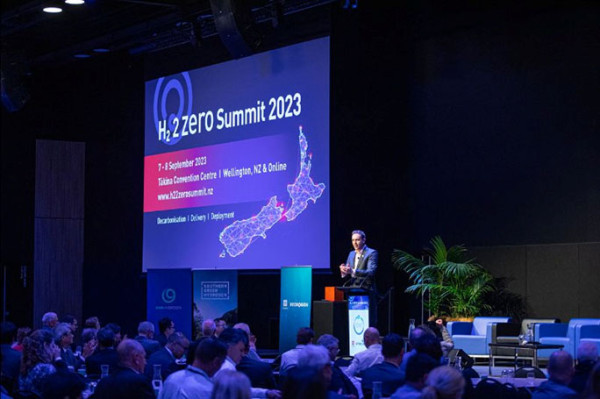Discussions on decarbonisation, delivery and deployment at 2nd hydrogen summit
Our work in the hydrogen space is part of concerted efforts nationally and globally to help make hydrogen the fuel of the future. Attendance at a summit helped raise awareness of projects and bring practitioners together.

H2 Summit 2023
Standards New Zealand was invited by the Hydrogen Council to attend and present an update to the energy sector at the H2 2 Zero Summit 2023, New Zealand’s second international hydrogen conference held at Wellington’s Tākina Convention Centre. The Summit was an opportunity for us to update the sector on how we are working towards the integration of hydrogen across the energy landscape.
The Keynote speaker was renowned environmentalist Sir Jonathon Porritt CBE, who gave sobering reminder that inaction by all countries is no longer an option and that the climate is heading into unchartered territory. Setting the context for hydrogen, renewable and green energies he directed everyone to dramatically lift their game, to match the speed with which things are changing in the natural world.
The Summit was attended by over 300 delegates (in person and online) and brought together 52 leading industry speakers from New Zealand and around the world, including the US, UK, Germany, France, Singapore, Japan, and Australia. Speakers represented more than 35 organisations and provided a wide range of industry announcements, innovative insights, and project updates over the two days. It was fantastic to see renewed commitment by attendees to making a positive difference, by advancing the uptake of hydrogen as part of our low emissions future both in New Zealand and internationally.
Presenting on hydrogen standards framework
Standards New Zealand Principal Standards Project Manager Chris Forsman, who leads energy sector standards development, provided a valuable update to the audience on the hydrogen standards implementation strategy, which supports the supply chain of a future low-carbon, hydrogen-based economy.
Judging by the networking discussions and presentations throughout the two days, it was apparent that significant progress has been made in New Zealand since the inaugural H22 ZERO Summit, which was held some 18 months ago.
Other key takeaways
Here are some other key takeaways from presentations given at the summit:
- Sir Jonathon Porritt’s call to action. Under current fossil-fuel steam reformation production 10kg of CO2 is produced for every 1kg of H2
- Ensuring a ‘Just Transition” is key to successful implementation. Just transitions bring people together to transform disruptive change into positive change.
- The Japanese Ambassador attended both days and is very keen for New Zealand, and potentially Australia, to partner with Japan and produce green hydrogen as soon as possible.
- A derivative of H2, green ammonia, will be the main global commodity required. The global demand and therefore opportunity for New Zealand to export H2 derivatives to start with is staggering.
- To produce H2 (gas/liquid) economically it needs to be around $2 USD/kg. According to the U.S. government’s ‘Hydrogen Shot’, which aims to bring green hydrogen prices down to $1/kg within one decade, there is an opportunity for at least a five-fold increase in clean hydrogen use. With or without additionality, this would require a massive increase in domestic power generation. Around 50 kWh is needed to produce one kilo of hydrogen, meaning the ‘Hydrogen Shots’ goal of 50 MT of hydrogen a year by 2050 would need around 2,500 TWh to produce, on top of the nearly 4,000 TWh of power already used every year in the country, a 62.5% increase. Interim targets aim for 10 MT a year capacity by 2030 and 20 MT by 2040. Put simply for all that hydrogen to be green, the extra power must be generated from emission-free sources, including wind, solar, nuclear, and hydro.
- In New Zealand HW Richardson are planning to convert their fleet of 1,500 trucks to dual fuel (Diesel/H2) 45–80% diesel displacement.
- Southern Green hydrogen is a massive project to produce green ammonia. This is a joint venture between Meridian, Mitsui (Japan) and Woodside Energy. It is still in the early design phase.
- Maersk Shipping expect to be Carbon ‘0’ by 2040 (750 ships). In train is the conversion of 12 x 16,000 ton ships to methanol by 2024, plus another 12 x 17,000 ton and 9,000 ton ships by 2026.
- GBV, who manufacture trucks in the South Island, are currently manufacturing 21 pure H2 Trucks – fueled by Hiringa Energy H2 .
- Team New Zealand in conjunction with ZeroJet have design and produced 8 x 13m chase boats all powered on H2.
While the pressures are mounting and climate change presents a real and present danger to people across the world, technology, innovation and international cooperation offers us all hope for a better future.
